[ad_1]
Let’s be honest, who didn’t watch Mad Men and think, damn, I want to be Don Draper. Here’s a fun fact, before he was the creative director, Don Draper was a copywriter. And it doesn’t take much to become on yourself. Plus, since this isn’t the 60s anymore, you can learn how to be a copywriter from home.
It might take a few months of groundwork before you can order a crystal decanter for your whiskey, but even with zero experience, you can earn a living writing copy from the comfort of your living room.
What is Copywriting?

Take a look at this banner for Adidas’s Adicolor line. Somebody had to think up and write the line: “These stripes are forever.” It’s short, but it’s memorable, and it reinforces the brand. That’s copy.
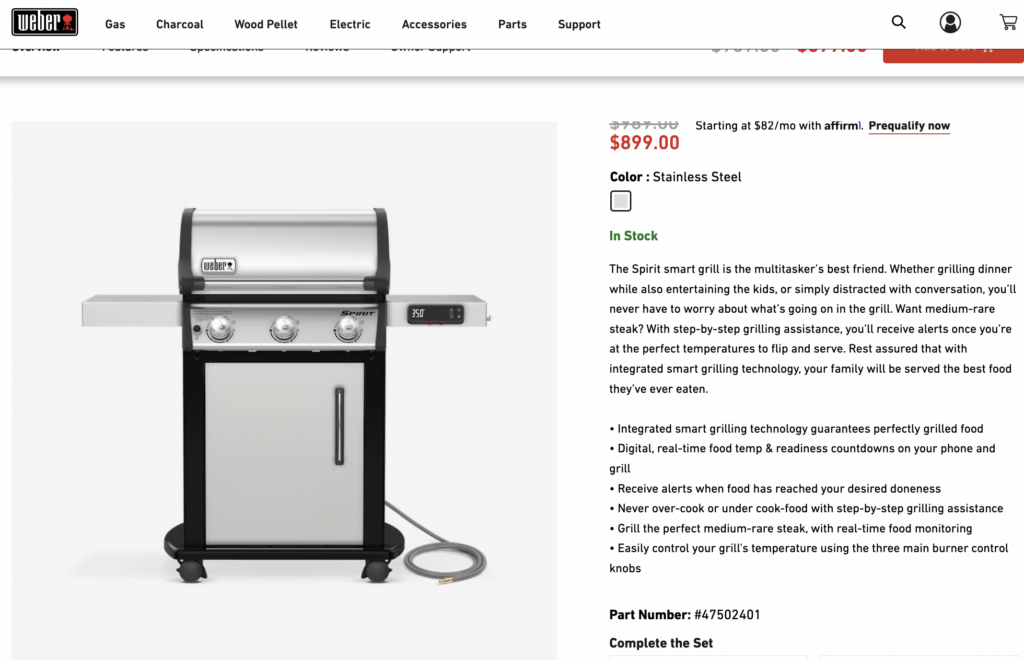
Now take a look at this product description for Weber’s Spirit BBQ. Notice the persuasive writing with phrases like “never have to worry” and “your family will be served the best food they’ve ever eaten.”
A good copywriter can persuade readers to click a link, join an email list, or buy something with a few cleverly written words. Copywriting encourages the reader to take action.
Think about when you visit a website and click on the landing page. You’ll often see a big image and a few choice pieces of text. Whoever wrote that text was flexing their copywriting skills. All the marketing emails you get in your inbox are another example of copywriting at work.
What Are the Different Types of Copywriting?
Often copywriters will specialize in writing a particular kind of copy. In general, copywriting is divided into two main categories: direct response and branding.
Landing Pages

Landing pages are usually the best example of direct response copywriting that we see online. Direct copywriting is the most obvious copywriting designed to persuade readers to act now. It’s not about building brand recognition and just getting on the radar; it’s about getting the sign-up, the sale, or whatever it is, then and there. Often businesses will offer a free trial or some kind of free download to encourage the reader.
Social Media Marketing
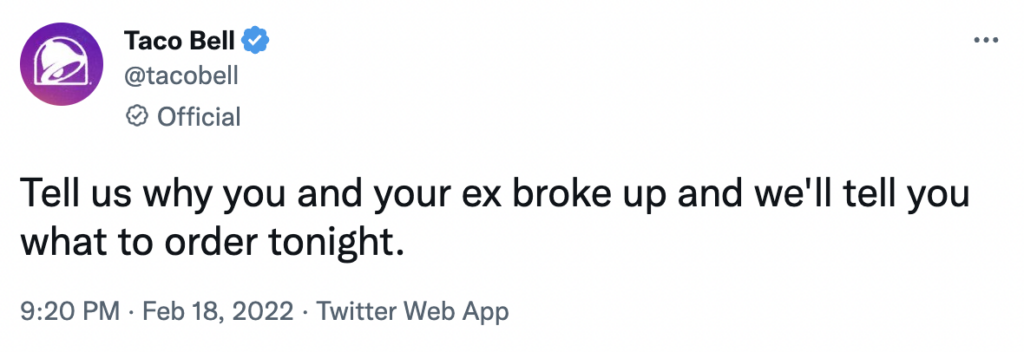
Copywriting that isn’t direct is known as branding. So while direct copywriting is about immediate action, branding is more about building brand awareness.
Social media has become more and more important for marketing, and this is where we see a prime example of brand copywriting. Any copy (which basically just means text) on social media posts for brands aims to reinforce the brand voice, build recognition, and get readers to act.
This can also include writing video scripts for Instagram, YouTube, and TikTok. So while no one actually sees the written copy, there is still a copywriter behind the scenes making sure to get the brand message across.
White Papers
This one might seem less obvious, but it is still an important part of marketing, especially for businesses that offer complex products or services. A white paper is essentially a document promoting and explaining a particular solution. White papers are more focused on informing the reader in a way that shows them your solution is the best.

From welcome emails to regular newsletters, email copywriting is a broad category just on its own. Copywriters write pretty much any kind of marketing email sent to a subscriber list.
SEO Copywriting
Of course, with anything online, it’s about getting people to actually see what you’ve written. One way to do that is by following SEO best practices and making sure your writing uses keywords associated with your brand, product, or service.
SEO is often used in content marketing when copywriting takes the form of more long-form articles. But SEO is important on all web pages, and you’ll see it at work in things like product descriptions.
Copywriting can take many forms, from social media posts to video scripts, but it is distinctly different from content writing. The aim of copywriting is to sell or persuade readers to take action. The aim of content writing is to inform and usually to drive traffic to a website through search engine optimization. If you’re more interested in content writing then take a look at how to earn extra money as a website content writer.
What Skills Do You Need to Be a Copywriter?
Were you the crafty kid who could always convince your parents you needed that toy that you didn’t really need? Or maybe you’re forever persuading that one friend who never wants to leave the house to come out for the night. If that’s the case, you just might have what it takes to be a copywriter.
The good news is you don’t actually need any formal training to become a copywriter. Especially if you’re looking to start freelance copywriting rather than getting a permanent position with an agency.
The basic skills you’ll need to be a copywriter from home are:
- Strong writing skills. If you failed Grade 9 English, copywriting *might* not be for you.
- Market knowledge. You can only convincingly sell laptops if you know something about laptops or at least something about the people that want to buy laptops.
- Some sales knowledge. Ultimately the goal of copywriting is to sell. There’s an art to knowing what words to write where to make that happen. Having some knowledge of marketing and sales is important.
- Ability to adapt. As a freelance copywriter, you could be writing about laptops one day, and garden sheds the next. You’ll also have to learn to take on different brand voices and consistently follow clients’ directions. Being versatile and ready to adapt is key.
If you’re more interested in getting a full-time contract for a single business or agency, some kind of degree in marketing, journalism, English, or communications can help you stand out if you have no actual copywriting experience.
However, working your way up to a high-paid copywriting job is mostly about building your portfolio. If you can prove your copy sells, no one will care if you went to college or not.
How to Be a Copywriter From Home In 5 Important Steps

Step 1. Learn The Basics of Good Copy
To be a professional copywriter, you don’t need a formal education, but that doesn’t mean you need any skills at all.
If you want to write copy for a living, you need to learn some of the basics. Luckily, there are lots of free copywriting courses and resources to help you learn how to write good sales copy.
As always, when looking to master a new skill, Udemy, Coursera by Google and Skillshare are all great places to start. All you have to do is search copywriting courses and find one tailored to what you’re looking to learn. Copywriters can and should also visit the American Writers & Artists Institute’s website for information, products, and training.
Some other courses if you want to learn how to be a copywriter from home:
And if you’re looking for some light reading, every aspiring copywriter could benefit from at least skimming:
You can also follow copywriting blogs like these and find lots of great advice and a community to engage with:
Another way to learn a few tips on copywriting is to just look at examples of it all around you. Think about times you were persuaded by copy; what worked? How can you instill that same energy or feeling?
Step 2. Build Your Portfolio

To land your first few clients, having some proof that you can actually write will do more than just telling them you’re a great copywriter. Most clients will be hesitant to hire someone with no examples of their work ready to share.
Build Your Own Website or Social media Following
Probably the best way to start cataloging your copywriting skills is to get a website up. It’s a great place to direct prospective clients, showcase your talent, and outline your services in one place. You don’t need to be an expert web designer to get a website up. Just make sure the copy *slays*.
Everything from your landing page to your About Me page can be examples of your writing skills to help secure more clients. Starting a blog on your website is another excellent way to prove your writing ability and your SEO knowledge.
Additionally, if you’re interested in getting into social media copy, you can try building your social media page. You can promote yourself as a copywriter to your social media following and even start networking that way. Then, when it comes time to prove your worth, you can refer clients to your page to see how successful your copy is.
Guest Blog
Another way to start building some traction as a copywriter is to write guest blogs. This is basically when you write a blog post for someone else’s blog, so it’s great if you don’t want to set up your own website, but want to have something published online.
Bonus points if you can guest blog for a copywriting or digital marketing blog. Or something in the niche that you’re interested in working in.
Volunteer
Finally, nonprofit organizations need copywriters too. Often they are worked into the budget, but smaller local charities might not have a marketing budget to hire a copywriter. Volunteering your copywriting services can be a win-win. The organization gets some work done, and you have something to add to your portfolio.
Step 3. Apply For Jobs
Once you’ve got the basics down and you have a few bits of writing to put in your portfolio, you’re ready to start applying for jobs.
The reality is while the copywriting business can be lucrative, it’s also competitive. You might have to take a couple of low-paying gigs before you start claiming six figures. But don’t let that discourage you. The key to building up a copywriting business for yourself is consistency. The more you work, the bigger your portfolio, and the more you can start to charge for your services.

Ad Agencies vs Freelancing
Even if you want to know how to be a copywriter from home, you still need to decide if you want to work for an agency or freelance. Both options have the possibility of working remotely, but working for an agency might restrict you in terms of what country or time zone you can work in.
For the most part, this post is geared towards those of you looking to become a freelance copywriter.
Nonetheless, here is a quick overview of what you can expect from either path:
Agency Pros
- Stable fixed income
- Benefits
- Potential to work under an experienced mentor
- High likelihood of working with big-name brands
Agency Cons
- Less flexibility (often 9-5, Monday to Friday and need to stay in the country/timezone)
- Restricted in terms of what projects you can take on
- Higher barrier to entry (more likely to need a college degree)
Freelance Pros
- Flexibility
- Higher earning potential
- Opportunity to pursue projects you’re passionate about
- Don’t need professional training to get started
Freelance Cons
- Feast-to-famine cycles
- Extra wrk finding clients, handling billing, etc.
Where to find freelance Copywriting Jobs
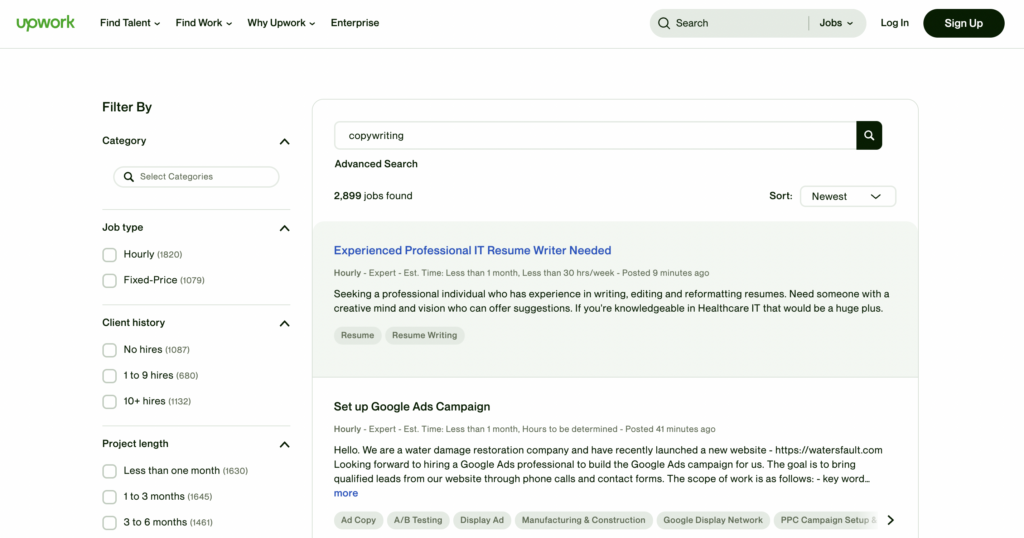
If you’re looking for copywriting work that you can do from home, there are a few job boards you can check that are geared towards freelancers and remote workers. You can also use social media to hunt for odd jobs and network with other copywriters that may be willing to pass on work if their own schedule is already full.
Some great places to find freelance copywriting jobs include:
Cold Pitch
Rather than scouring job boards to find clients or bidding on freelancer platforms – there is another way. A ballsier way that can pay off big time. Go out there and actively seek work yourself by marketing your copywriting services to clients that maybe didn’t even know they wanted a copywriter.
It’s called cold pitching.
Colleen Welsch from the Freelance Writer’s Guide has a great post on cold pitching, but here are the basics.
Successful copywriters will send out what’s called a “cold email pitch.” This is basically just an email to a client you’d like to work with and an offer of your services, regardless of whether or not they are hiring or looking for freelancers.
Here are some quick tips on how to write a cold pitch:
- Make sure you have a professional email address to send from. Don’t send a cold pitch from [email protected])
- Outline the value you can bring. What is your client missing that you can do for them? Maybe their social media page is lackluster. Tell them the benefits of social media marketing and how you can benefit their business with social media copy.
- Don’t discuss rates in your first email. You’ll get to it eventually, but it can set the wrong tone if you put it in your initial cold pitch.
- Include links to your website/portfolio. Don’t wait for them to ask; they won’t; they’re busy. Include any relevant links to your work in that first email.
- Get creative. Cold pitching allows you to show your talents, creativity, and personality. Go for it! Your pitch doesn’t need to be stuffy and formal; just keep it professional.
- Include a clear call to action. Be sure to end your email with the next steps for your potential client. It should be obvious how they can get in touch with you or find out more about your services. This could be an encouragement to call, email back, or visit your website to get in contact.
- Follow up. Always, always, follow up. Converting prospects into clients is all about staying fresh in their minds. Don’t just send one email and assume no response is rejection. Set reminders for yourself to follow up on all your pitches.
Step 4. Choose a Niche or Specialty

When you’re just starting out, you might not know what kind of copy you want to write. Once you’ve tried your hands at a few different types of copy and gotten a feel for what you’re good at, you can pick a specialty.
One of the best parts of being a freelance copywriter is that you get the opportunity to try a variety of projects. This is a great way to build your portfolio and also help you decide what you enjoy. Choosing a specialty allows you to focus on building your credentials in a certain category of copy in order to be more competitive.
Most clients are easily swayed by words like “proven” and “expert.” If you focus on landing page copy and can point to several different landing pages you’ve written, higher-paying clients are more likely to choose you over another copywriter whose portfolio is primarily white papers.
On top of choosing what kind of copy you want to write, you might also consider picking a niche to work in. By focusing on a particular niche, you can get to know the market better, and your copy can be more persuasive as a result. Niching down can also help you land high-paying clients.
Some of the most lucrative niches for copywriters include:
- Medical
- Legal
- Finance
- Tech
Search Engine Optimization
Can you be a copywriter from home, even if you don’t know the first thing about SEO? Technically, yes.
BUT knowing SEO will supercharge your copy.
Regardless of whether you mostly keep it short and sweet or you’re working on long-form copy, SEO is a great skill to have. If you’re planning to write copy online, which is likely if you want to work from home, you’ll be edged out by your competition if you can’t offer some basic SEO.
Search engine optimization allows search engines like Google to understand the target and purpose of your copy. SEO copywriting takes this one step further by ticking all the boxes for Google while still appealing to the average reader.
You might think SEO is just for content writers, but copywriters can write blog posts too – including ones with some kind of call to action in it. Don’t underestimate the power of content written by a copywriter. When you add SEO knowledge to the mix, you’ve got a killer combination for online conversions.
Looking to learn a little bit more about SEO? Check out the best SEO blogs to follow.
Step 5. Invest in Yourself!

Once you’ve started making a profit, don’t be afraid to invest in yourself! Take another course; maybe a paid one this time. No matter how much you think you know, there is always more to learn.
Or use the money to revamp your website and branding. Investing in your marketing can help you start attracting clients to you instead of chasing them down yourself.
Nurturing a freelance copywriting career is the same as building a copywriting business. By putting money back into your business, you can reap bigger rewards.
How Much Do Copywriters Make?

According to the US Bureau of Labor Statistics, the average copywriter makes roughly $57k/year. Interestingly, Indeed has the average freelance copywriter’s salary at $67k/year. That’s a whopping $10k difference in case you needed more convincing that freelance is the way to go.
However, the amount you make as a freelance copywriter can also vary drastically.
Full-time freelance copywriters make anywhere from $20,000-$200,000 or more a year.
But that’s not to say that copywriting is a surefire way to get rich quickly.
You have to understand that your first few clients will likely pay you significantly less than someone with 5, 10, or 15 years of experience. Just like someone starting out in an entry-level position at an advertising agency will earn closer to $33k/year, freelancers with no experience can’t charge premium rates right away.
It’s true you do hear a lot about six-figure copywriters, but most copywriters tend to earn much closer to the $50-60k mark. The best thing about freelance copywriting is the flexibility it affords you and the opportunities to land your dream clients and work on projects you’re truly passionate about.
As you build your freelancing career, you can start to charge more, even hire people under you as your workload increases and eventually become Don Draper and end up having your own copywriting business.
How to Price Yourself
Whether you’re just looking for a side hustle or you want to know how to be a copywriter from home to replace your full-time income, here are the basics of how to price your services.
You can opt to charge either:
- Hourly
- By project
- By retainer
- Commission
Charging hourly is probably the best way to go when you’re just starting out. For reference, the average hourly rate for professional copywriters in the US according to Indeed is $28.94.
Once you’ve completed a few projects for different clients, you might decide to adjust your payment model. Payment by project is probably the most popular pay structure for freelancers.
How much you charge should depend on:
- skill level
- the industry you are writing for
- type of copy you are expected to produce
- turnaround time
Job boards like Upwork allow you to bid for projects, so you get an idea of how much others are bidding and can price yourself based on that. Be careful, though, as Upwork can sometimes be flooded with low bidders from places with a lower cost of living.
At the same time, when you’re just starting out, be realistic with your pricing. It should reflect that you’re at the start of your copywriting career without the wealth of experience a successful copywriter might have.
To get an idea of the range of pricing, take a look at this survey copywriter Abbey Woodcock did of 68 of her colleagues and what they charged:
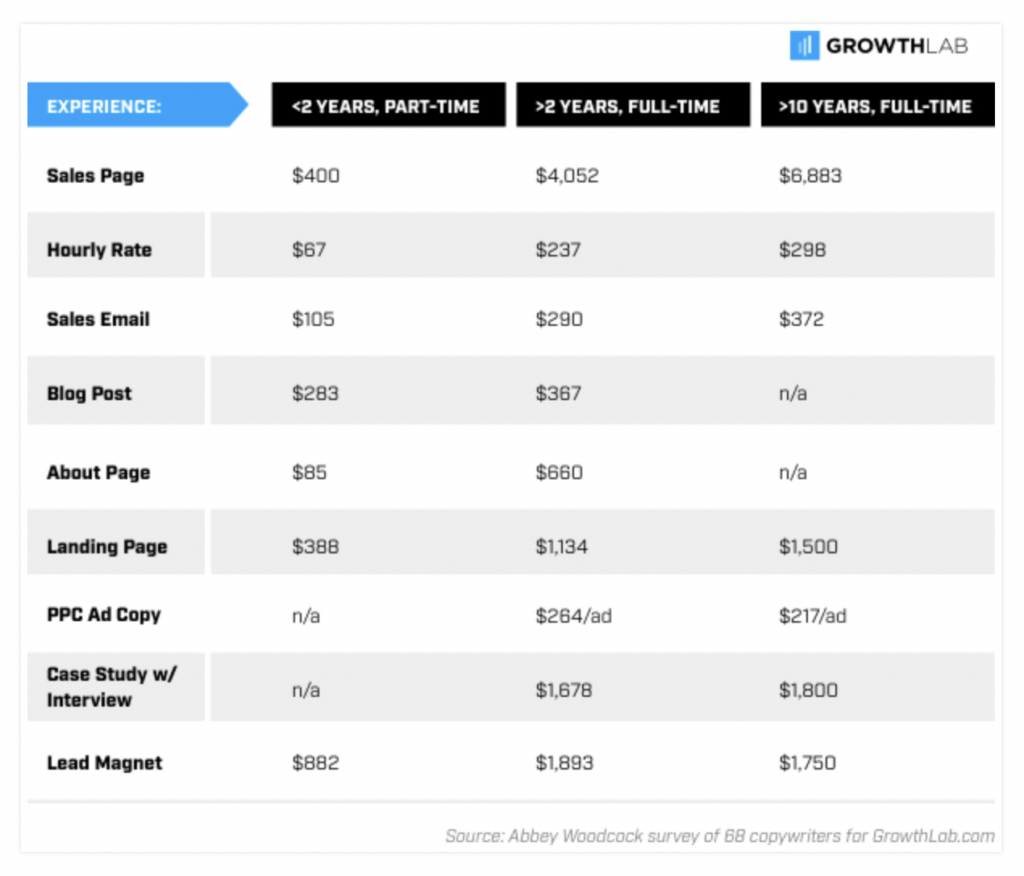
The first thing you’ll notice is a massive discrepancy based on years of experience. The second thing you might notice is that even copywriters with less than two years of experience can charge a pretty penny for their services. Good clients will pay your worth.
That’s not to say you don’t have to do your time in the trenches and take low-paying gigs to build your portfolio, but make sure your rates increase alongside your skill and experience.
Tips For How to Be a Copywriter From Home

- Build your community. When you’re new to any industry, advice from others that have been in the game for a while can be invaluable. So can sharing your experience with people that are in the same boat. Facebook, LinkedIn, or even just the comments sections of blogs are invaluable places to get copywriting help and advice. Also, don’t underestimate how much work you can get by word of mouth. Networking with other copywriters can be a great way to pick up new clients.
- Always be willing to learn. Even after you’ve been a copywriter for 100 years, there’s still more you could learn. When you’ve only been a copywriter for one year or five years, there’s a ton to learn. Good copywriters continuously challenge themselves to be better. Be willing to learn new techniques, research your niche, find out more about your target audience, and always work on how you can perfect your writing.
- Communicate with your client. There’s nothing worse than finishing a project to find out it’s not really what your client was after. Especially when you’re working with a new client, make sure you have open lines of communication to make sure you’re getting it right for them, and you can communicate about things like deadlines.
- Make the most of your toolbox. Just like a carpenter relies on his hammer, there are tools for copywriters too. Having the right tools in your toolbox can help you get the job done faster and to a better standard.
- Keep going. Maybe in your first few months copywriting you only make $100. Keep going. Freelancing is like a snowball. The more jobs you take, you start to build a reputation for yourself, you can start to charge more, and the longer you keep at it things will get better.
You’d be hard-pressed to find any writer that didn’t have a specific tool in their back pocket.
Apps like Grammarly or Hemmingway are crucial for making sure your writing is error-free. Both also have a host of extra features to help you improve the way your writing sounds and better target your market.
Grammarly
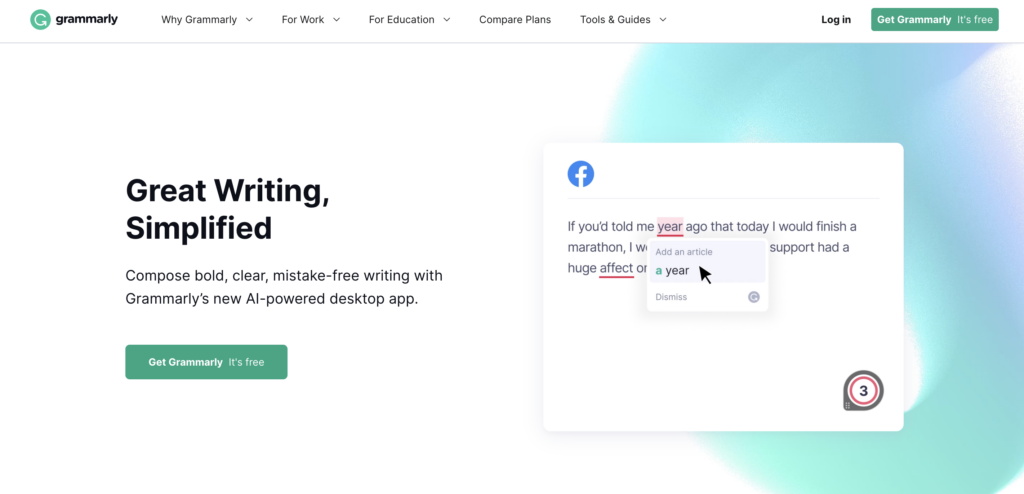
There’s a reason Grammarly is the most popular text editor out there. Not only does it catch typical errors like spelling or grammar, but it will also highlight text that needs attention. This means things like passive voice, copy-weakening adverbs, and sentences that are difficult to read all get pointed out.
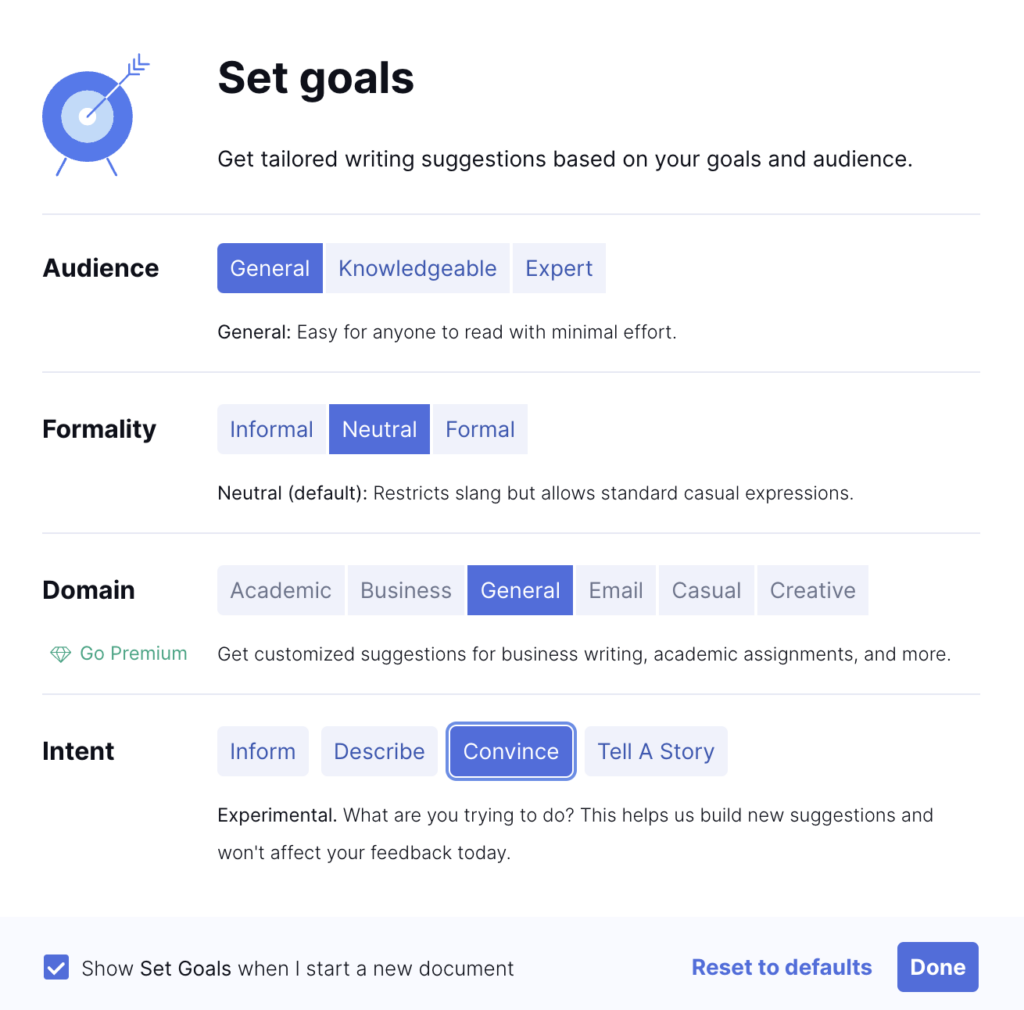
Plus, you can set goals for your content and let Grammarly give you feedback based on what you are trying to achieve. This can be especially useful for long-form copy when you want to make sure you’re using the right tone in your writing.
Finally, Grammarly will also check your content for plagiarism and help you improve your content’s clarity.
Jasper
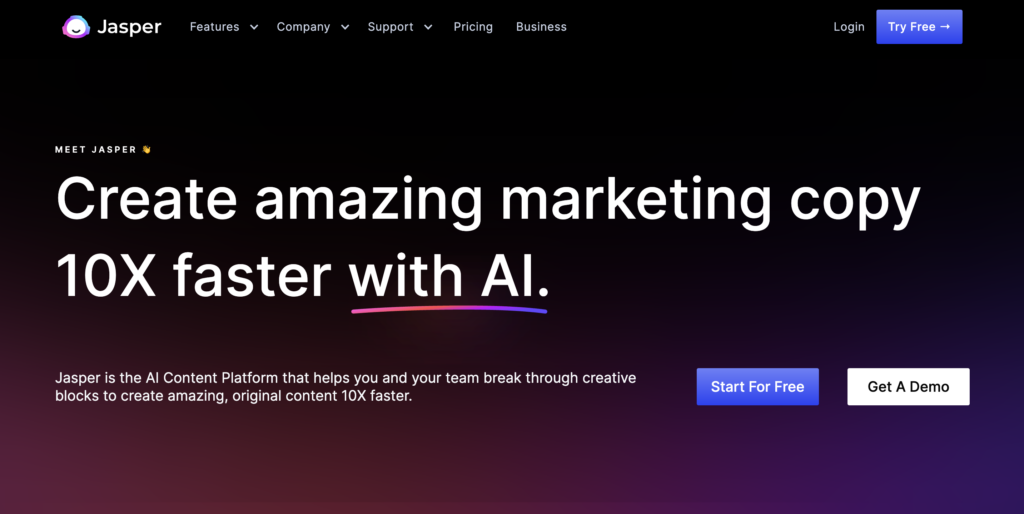
Another useful software for copywriters is an AI writing assistant. AI copywriters like Jasper can help you write copy faster. Jasper can help spark new ideas for fresh content while also following proven high-converting templates. Additionally, you can use Jasper to improve your SEO or work in multiple languages.
For that extra boost when it comes to writing, view our full guide to the best copywriting software for tools to help you level up your copy game.
Conclusion
There are millions of freelance writers around the world but copywriting takes a specific talent. Converting readers into customers with nothing but words is a certain kind of magic – which is exactly why it pays so well.
Now that you know everything you need to know about how to be a copywriter from home, you can start hustling some of that copywriting money too.
[ad_2]
Source link

